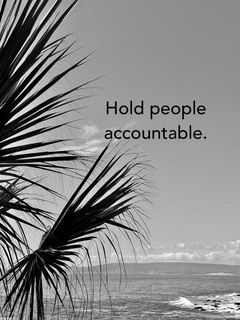How to Teach Accountability and Avoid “Bougie/Karen/Chad-ish” Behaviors
- Pat Kelsaw
- Dec 9, 2024
- 4 min read

As I begin to close out my weekly posts for 2024, I wanted to address this topic: accountability. So, let me start with a confession: my tolerance level for people and their excuses and/or lack of self-awareness for their behaviors that impact my life has plummeted. Not counting similar experiences that I hear about in my role as the “wise elder” or the “sounding board/thought leader” to others. This acceptance or tolerance for others’ lackadaisical behaviors- whether it’s in the workplace or among family is troubling; not fulfilling commitments, or providing mediocre (at best) service, or dealing with abrasive attitudes & behaviors that have gone unchecked. Yet sometimes we recognize that the energy it may take to address it really isn’t “worth” it. But what does that say about US - what we value and expect from others?
What I have come to terms with these days – there is a thin, fine line between holding people accountable, teaching accountability; a razor-thin line between standing for what’s right and empowering others to do better. And when does it cross into the territory of being labelled “Bougie/Boujee”, or deemed “old-fashioned” or a grumpy old delusional person, or coined the colloquial “Karen” or “Chad”? You know, those infamous labels we call out that scream entitlement, misplaced authority, pretentiousness, and an exhausting need to always complain about something.
Why accountability matters.
Accountability is (or should be) a cornerstone of a healthy relationship, workplace, group or community. Holding people accountable is about integrity. It’s about commitment, follow through. It’s about fairness, clarity, and mutual respect. When accountability is rooted in these values or principles, it strengthens relationships and builds trust. Accountability is NOT about power, micromanaging or about catching someone in a mistake.
Teaching Accountability At Any Age.
Teaching accountability requires patience and a willingness to guide others. You’re not just addressing the issue—you’re guiding them toward realistic, potential solutions and showing them how their actions (or inactions) impact the bigger picture. This approach shifts the focus from blame to empowerment. Teaching accountability can be a long-term investment sometimes, it can be more nuanced and problematic, because some folks are just clueless.
While teaching accountability is typically focused on during the child/adolescent developmental stages, for example, a teenager learning about responsibility – the reality of what “adulting” really means. But who are the “adults” as their guides, teaching the teen about what accountability means? An individual’s lack of accountability can unfold or show up at any age- like a new staff member adapting to a workplace culture, or a friend/relative who has never been challenged to take responsibility for their choices. Teaching accountability is often needed when someone (NO MATTER THEIR AGE) lacks the skills, experience, or the mindset/humility to take ownership of their actions. It’s a teachable moment time, not a trial. And please don’t assume that it was provided by someone else, at any stage of development.
You teach people how you want to be treated.
It is easy to avoid those uncomfortable conversations for fear of coming across as entitled or abrasive. But accountability is a critical skill - for you, for others, and for all of us – in the relationships and spaces we share. Teaching accountability isn’t just for workplaces; it’s for families, friendships, and sometimes even with strangers. Whether you’re mentoring a colleague, raising children (whether your own or someone else’s) or giving constructive feedback to someone at the store, the goal is the same: help others understand that their choices have a ripple effect outward – impacting the lives/plans of others.
To avoid “Bougie/Karen/Chad-ish” tendencies:
A “Bougie/Karen/Chad” individual makes everything personal; it isn’t just about entitlement; it’s about tone, overstepping boundaries, and attempting to seek control under the pretext of “doing the right thing.” So, take a breath and ask yourself:
Is this issue about fairness, safety, advocacy (for yourself or someone else), mutual respect or setting healthy boundaries? If not, then sometimes it’s best to let it go.
Am I addressing this from a place of kindness or frustration? Kindness keeps doors open; frustration slams them shut. But don’t mistake a person’s kindness as a weakness!
Am I offering realistic solutions or just venting my displeasure? Accountability is constructive, not destructive. It is about teaching.
Wisdom from Big Mama:
It’s one thing to demand someone own up to their mistakes, but it’s another to help them understand how to take responsibility—and why it matters. How you hold people accountable matters. Are you clear about the expectations upfront? Do you address issues calmly and directly, or do you use guilt, shame, power/influence, or frustration to get your point across? Ask open-ended questions like, “What could we do differently next time to avoid this situation?” – questions that invite reflection and ownership – behaviors to becoming a capable, productive, and supportive wise adult. Accountability is about helping others grow,
Accountability is a balancing act.
Balance accountability with grace. It’s about being firm yet empathetic, assertive yet open. Again, accountability is a two-way street. If you want to hold others accountable, hold yourself accountable for your actions too. And that requires self-awareness and a willingness to examine your own actions/responses. And when you do that, there’s no room for the “Karen/Chad-ish” or “Bougie (Boujee)” entitlement energies. The choice is yours!
Weekly wisdom, in their own words:
“Do what you can to show you care about other people, and you will make our world a better place....”
— Rosalynn Carter (1927 - 2023)
Grant Seekers, here’s this week’s Big Mama’s Playbook
Interested in starting 2025 with professional development/leadership coaching or nonprofit consultation? Reach out to me for a free 45-minute brainstorming session!
Comments